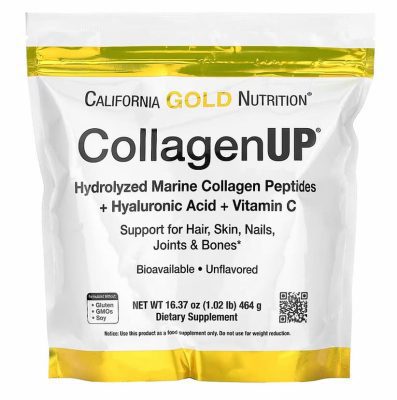Skin aging is an inevitable part of life, and understanding its mechanisms can empower us to make informed choices in our skincare routines. As we age, the production of collagen, a vital protein that provides structure and elasticity to our skin, declines. Collagen is responsible for keeping our skin firm, plump, and youthful.
Many turn to collagen creams and serums in the quest for eternal youth. However, the scientific evidence supporting their effectiveness is lacking. Collagen molecules are often too large to be absorbed through the skin, making collagen creams and serums a useless waste of money. What disturbs me the most is that some are very pricey!
Let’s explore the topic further to learn what causes collagen loss in the face, how to prevent it, and how to restore it.
Understanding Skin Collagen: Types of Collagen and Functions
Collagen is a diverse protein, with at least 28 different types identified. The three most common types are 1, 2, and 3. Types 1 and 3 provide structure to our skin, bones, and ligaments, while Type 2 is found in cartilage and offers shock-absorbing properties to our joints.
The most abundant types of collagen in the skin are types I, II, and III. Here’s how they contribute to skin elasticity:
- Type I Collagen: This is the most abundant collagen type in the skin and provides structure and support. It plays a significant role in maintaining skin firmness, elasticity, and resilience. Type I collagen is particularly important for preventing sagging and wrinkles.
- Type III Collagen: This type is often found alongside type I collagen and contributes to the suppleness and elasticity of the skin. It is commonly found in reticular fibers within the skin.
- Type II Collagen: While type II collagen is more prevalent in cartilage and joints, it can also be present in the skin. Its role is to provide support and flexibility.
To increase skin elasticity, it’s essential to stimulate the production of these collagen types.
Factors Contributing to Losing Collagen in Face (in Skin)
Aging
Natural Degradation: Collagen loss is an intrinsic aspect of aging, starting as early as the mid-20s. The body’s natural collagen production declines and existing collagen fibers degrade over time.
20s and 30s: Minimal decline, but collagen production starts slowing down, with around 1% loss of collagen per year.
40s: Accelerated decline in collagen production, approximately 1-2% loss of collagen per year.
50s and Beyond: Further reduction in collagen synthesis, potentially more than 2% loss of collagen per year, and the rate may increase.
Noticeable Effects: The visible effects of collagen loss become more pronounced in the late 30s and 40s, manifesting as sagging skin, fine lines, and wrinkles. Reduced collagen levels contribute to a loss of skin elasticity and firmness.
Sun Exposure
UV Radiation: Prolonged exposure to sun ultraviolet (UV) rays is a major contributor to collagen breakdown. UV radiation accelerates losing collagen in face, leading to premature aging signs such as wrinkles, sunspots, and uneven skin texture.

Photoaging: This process, known as photoaging, is characterized by the formation of elastin fragments and the activation of enzymes that break down collagen, resulting in a loss of structural support for the skin.
Lifestyle Factors
Smoking: Smoking is a significant lifestyle factor that accelerates collagen loss. The chemicals in tobacco smoke restrict blood flow to the skin, reducing oxygen and nutrient supply. This impedes collagen synthesis and contributes to premature aging.

Excessive Alcohol Consumption: Heavy alcohol consumption can dehydrate the skin and impair collagen production. Additionally, it may contribute to oxidative stress, further compromising collagen integrity.
Poor Dietary Choices: Diets high in processed foods, sugars, and unhealthy fats can contribute to inflammation and oxidative stress, negatively impacting collagen. A nutrient-poor diet may lack essential building blocks for collagen synthesis.
Dehydration from insufficient water intake can also impact collagen, as hydrated skin is more resilient and less prone to fine lines.
Lack of physical activity can potentially contribute to a decline in overall skin health, including collagen production. When the body is inactive, blood circulation may be reduced, leading to less nutrient and oxygen delivery to the skin. This, in turn, can impact collagen synthesis and skin regeneration. When working full-time in the office and having chores and study and watching Netflix after, it,s pretty hard to stay on track with physical activity, but it’s important.
Hormonal Changes
Menopause: Hormonal changes during menopause lead to a decline in estrogen levels, impacting collagen synthesis. Reduced estrogen levels contribute to skin dryness, decreased elasticity, and the formation of wrinkles.
Postpartum Periods: Pregnancy and postpartum periods involve hormonal fluctuations affecting collagen levels. These changes may contribute to skin laxity and stretch marks.
Chronic Health Conditions
Autoimmune Disorders: Conditions like rheumatoid arthritis and lupus, which involve autoimmune responses, can affect collagen production and contribute to skin issues.
Diabetes: Chronic high blood sugar levels in diabetes can lead to the formation of advanced glycation end products (AGEs), which impair collagen function and contribute to skin aging.
Genetic Disorders: Certain genetic conditions may affect collagen formation and structural stability, influencing the skin’s resilience.
Adopting a skincare routine, protecting against sun exposure, maintaining a healthy lifestyle, and addressing nutritional deficiencies can collectively contribute to boost collagen in face, promoting vibrant, youthful skin.
How to Increase Collagen in Face
As we’re losing collagen, you might be interested in how to restore collagen in the face.
Collagen-Boosting Food
Antioxidant-Rich Choices: Choose colorful fruits and vegetables like berries, tomatoes, and leafy greens. Antioxidants from them help to protect collagen from free radical damage.

Embrace beta-carotene-rich foods like carrots and sweet potatoes, as beta-carotene is essential for collagen creation. Studies reveal a positive correlation between higher beta-carotene intake and thicker skin collagen. So this food might increase collagen in skin naturally.
Vitamin C-Packed Foods: Include citrus fruits, strawberries, and kiwi in your diet.
Vitamin C is essential for collagen synthesis and plays a crucial role in maintaining skin elasticity (nonetheless, the latest studies say that vitamin C does not create that magical concentration in the skin to increase collagen in face significantly).
Omega-3 Fatty Acids: Incorporate fatty fish like salmon, walnuts, and flaxseeds into your meals. Omega-3 fatty acids support collagen production and contribute to overall skin health.

Protein Sources: Choose lean proteins like chicken, fish, eggs, and legumes. Protein provides the amino acids necessary for collagen formation.
Sun Protection
The best way to increase collagen in the face is to prevent its loss.
As we already know, excessive sun exposure and UV radiation are two of the worst enemies of collagen in the skin. That’s why it’s important to protect from it.
Broad-Spectrum Sunscreen: Select a high SPF sunscreen and apply it generously to exposed skin, this will protect you from losing collagen in face, neck, hands (this area is often overlooked) and any other area exposed to sun. Look for products that offer broad-spectrum protection against UVA and UVB rays. Not all sunscreens mention anything about UVA protection, so you should look for PA+++ or PA++++ markings. Read about one such sunscreen in the Beauty of Joseon Sunscreen Review.
If you have oily skin, find the perfect sunscreen that you’d love to apply in the best sunscreen for oily skin. (also suitable for acne-prone sensitive skin)
If you have oily skin and you’re looking for a tinted option, read the best tinted sunscreen for oily skin.
UV-Protective Clothing: Invest in clothing with UPF (Ultraviolet Protection Factor) to create an additional barrier against harmful UV radiation.
Stylish Hats: Wear wide-brimmed hats to shield your face and neck from direct sunlight, reducing the risk of collagen breakdown caused by UV exposure.
Sunglasses: choose sunglasses from trusted brands that have certificates that they really protect from UV rays. Mass-market stores often protect glasses that don’t protect from UV, which creates a false feeling of protection and can even harm the eyes. So opt for trusted shops and brands and ask the seller for a certificate.

Collagen-Boosting Skincare Ingredients
While questioning how to increase collagen in face, skincare comes to the mind first. There are serums, creams and toners with skincare actives that can boost collagen in face.
Retinoids
Choose skincare products containing retinol to stimulate collagen synthesis, reduce fine lines, and enhance skin texture. Read here How to use retinol.
Peptides
Peptides are short chains of amino acids that can have various effects on the skin, including boosting collagen production. Look for peptides in serums or creams which contribute to collagen production and support skin renewal.
Matrixil and Copper Peptides are quite famous, though there are others.
Palmitoyl Tripeptide-1 and Palmitoyl Tripeptide-7 work together to promote collagen synthesis and improve skin firmness. Often found in anti-aging products targeting skin firmness and elasticity, as well as in Peptide Lip Treatment products.
There’s a great moisturizer with peptides – find more in Klairs Midnight Blue Calming Cream Review.
Vitamin C and E
Incorporate serums or moisturizers containing vitamin C for collagen synthesis and vitamin E for antioxidant protection. Besides, vitamin E helps Vitamin C to work better in skin and is a good preservative (vitamin C is unstable so products where vitamin c is accompanied by vitamin E stay potent longer).
Niacinamide: Opt for products with niacinamide to improve skin elasticity, boost collagen production, and address uneven skin tone. Read here about niacinamide in skincare.
Coenzyme Q10
Enhancing Collagen Synthesis: CoQ10 is involved in the energy production process within skin cells, aiding in cellular activities, including collagen synthesis. By promoting efficient energy production, CoQ10 contributes to the maintenance and production of collagen, helping to keep the skin structure resilient.
Antioxidant Protection: Neutralizing Free Radicals: CoQ10 acts as a potent antioxidant, neutralizing free radicals that can damage collagen and contribute to premature aging. Guarding Against Environmental Stressors: Exposure to UV rays and environmental pollutants can accelerate collagen breakdown. CoQ10 helps shield the skin from these stressors, minimizing collagen damage.
Topical Application in Skincare: Product Inclusion: Look for skincare products enriched with CoQ10, such as serums or moisturizers. These formulations aim to deliver CoQ10 directly to the skin, providing targeted support. Collagen Preservation: Regular use of CoQ10-infused skincare can contribute to maintaining collagen levels, reducing the visible signs of aging, including fine lines and wrinkles.
Supplemental Support: CoQ10 can be taken orally as a supplement. While topical application targets the skin directly, oral supplementation ensures the body receives CoQ10 internally. Holistic Collagen Support: Combining topical and oral approaches can offer holistic collagen support, addressing both external and internal factors contributing to collagen decline.
Procedures that Increase Collagen in Face
Microneedling
Professional Guidance: Consider in-office micro needling sessions conducted by a skin care professional to ensure proper technique and controlled depth. Microneedling, when performed professionally, involves creating controlled trauma to the skin using fine needles. This stimulates collagen in face and thickens the skin.
Caution: professional sessions at a dermatologist or plastic surgeon’s office offer a safer and more effective approach.
Red Light Therapy
LED light devices, particularly those using red light therapy, can be valuable for enhancing skin health and collagen production. Red light, with wavelengths between 620 to 750 nanometers, penetrates the skin, stimulating cells and promoting the production of adenosine triphosphate (ATP), a cell energy source. This boost in energy encourages the creation of collagen, vital for skin elasticity.
Near-infrared light, with wavelengths ranging from approximately 750 to 1400 nanometers, is also utilized in skincare devices, offering benefits similar to red light therapy. Near-infrared light penetrates deeper into the skin, reaching structures like muscles and joints, and can contribute to improved blood flow and tissue repair.
Near-infrared light can stimulate cellular activity in the context of collagen production, supporting the synthesis of collagen and elastin. This, in turn, enhances skin elasticity and firmness. Like red light therapy, near-infrared light devices can be used for home treatments with FDA-approved options available.
Devices often have both red and near-red light, so look for those which have both wavelengths. This is not necessary a face mask, you can opt for a portative device or a panel which you might also use for your upper chest, neck, back etc.

These devices benefit the skin by reducing inflammation and creating a more favorable environment for collagen preservation. Opt for FDA-approved home-use devices or consider professional treatments for more intensive sessions. Consistency is crucial; establish a regular schedule for red light therapy sessions. While results may take time, the holistic benefits, including improved circulation and overall skin health, make it a valuable addition to your skincare routine.
Exercise caution by using proper eye protection and, if necessary, consult with a dermatologist or skincare professional before starting red light therapy, especially for those with existing skin conditions.
Lifestyle Choices
Regular Exercise: Engage in regular physical activity to enhance blood circulation, promoting nutrient delivery to the skin and supporting overall skin health.
Sufficient Sleep: Prioritize quality sleep, as it is crucial for cell regeneration and collagen synthesis during the night.
Stress Management: Practice stress-reducing activities such as meditation, yoga, or deep breathing to minimize the release of stress hormones that can cause the loss of collagen in the face.
Reduce the consumption of sugar, as glycation, a process triggered by sugar binding to collagen molecules, leads to collagen fiber distortion. This distortion contributes to premature aging, thinning of the skin, and wrinkle formation.
Balancing sugar reduction with an increased intake of protein-rich foods creates an effective recipe for collagen support.
Collagen Supplements
Collagen supplements, specifically hydrolyzed collagen peptides, offer a convenient and effective way to boost collagen levels. Studies demonstrate increased collagen content in the skin after consistent supplementation.
Opt for reputable brands offering hydrolyzed collagen peptides. Users have reported improvements in skin texture, joint health, and hair thickness after incorporating collagen supplements into their routine.
An example of the hydrolyzed collagen peptides is California Gold Nutrition, CollagenUP, Hydrolyzed Marine Collagen Peptides with Hyaluronic Acid and Vitamin C, Unflavored. This product is trusted by a huge number of people and has great reviews, making it and other forms of this product (they also have capsules and packets) the best collagen supplements for women.
The specially processed fish collagen is enzymatically hydrolyzed (broken down) into low molecular weight component amino acid peptides in order to help ensure optimal absorption and bioavailability

You can check it here on iHerb (ships worldwide). I have been buying products (and this collagen too) here for nine years now (wow, time flies!), because of ease of use and better prices (they have discounts sometimes, making it even more pleasant).
For additional discounts, use the Rewards code NAT0553 on checkout.
By integrating these practical approaches into your skincare routine and daily life, you can take proactive steps to boost collagen, maintain skin health, and naturally slow the aging process.
Conclusion
Understanding collagen and the factors influencing its production is crucial for effective skincare. While collagen supplements may not be the magic solution, adopting a holistic approach with a balanced lifestyle and incorporating proven collagen-boosting ingredients can contribute to healthier, more youthful skin. Embrace these practical tips to nourish your skin from within and defy the aging process naturally.